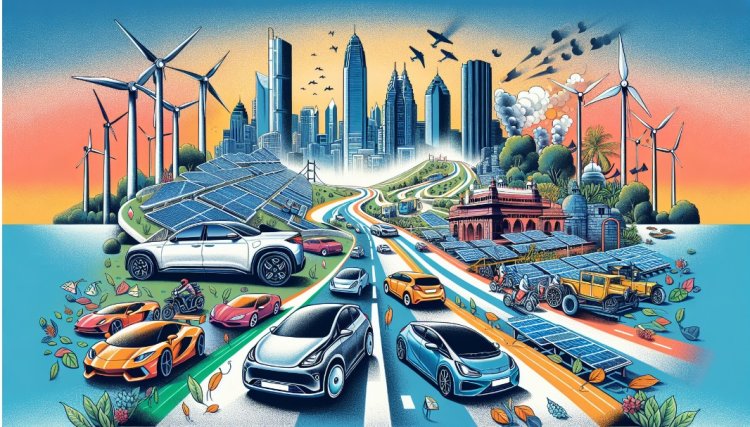The Future of the Car Industry in India: Opportunities and Challenges
Buckle up! India's car industry roars into the future. Explore both the exciting opportunities and pressing challenges that await, from the electric vehicle boom to infrastructure hurdles. Discover how India can become a global automotive leader.

Introduction
The automotive market in India is experiencing rapid growth, making it a promising investment opportunity for companies in the industry. With close to 4 million cars sold annually, India is becoming a key player in the global automotive market. Long-term investment in India is crucial, as the country has the potential to be the next China in the 2030s. Companies that neglect India now will miss out on a significant opportunity in the future.
For the German automotive industry, India holds great significance. With the need to diversify and expand into new markets, India cannot be ignored. However, some automotive companies have missed the mark in India, failing to adapt to the unique requirements and preferences of Indian consumers. To succeed in India, companies should focus on electric cars and position themselves as leaders in the segment.
India's growing automotive market is not only important for its population but also for the German automotive industry. India is now the third-largest car producer in the world, surpassing Germany. While German carmakers have made efforts to establish a presence in India, they still lag behind market leaders like Maruti Suzuki.
The environmental impact and air pollution in India are driving change in the car industry. Car manufacturers, including Maruti Suzuki, are rethinking their approach and moving towards long-term electric vehicles as the government tightens emission norms. The transition to e-mobility in India presents an opportunity for companies to make a significant impact in the country's car industry.
The Indian Automotive Market
India's automotive market has been experiencing rapid growth, making it an attractive investment opportunity for companies in the industry. With close to 4 million cars sold annually, India is becoming a key player in the global automotive market.
In fact, India has surpassed Germany and is now the third-largest car producer in the world. This growth is driven by the increasing need for daily transportation solutions in a country with a population of over 1.4 billion people. However, German car manufacturers have been struggling to establish a strong presence in India, lagging behind market leaders like Maruti Suzuki.
One of the key factors driving change in the Indian automotive industry is environmental impact and air pollution. As the government tightens emission norms, car manufacturers, including Maruti Suzuki, are rethinking their approach and moving towards long-term electric vehicles. This presents a significant opportunity for companies to make an impact in India's car industry by focusing on electric cars.
Currently, Maruti Suzuki dominates the Indian market with its small, fuel-efficient cars that are well-suited to the needs and preferences of Indian consumers. However, there is a growing demand for luxury and mid-range vehicles as the standard of living in India rises. German car manufacturers have the opportunity to tap into this market by providing quality, technologically advanced vehicles that offer good value.
While the luxury car market in India is growing rapidly, it still accounts for only a small percentage of the total market. This is partly due to the high cost of imported luxury cars, as customs duties and taxes make them significantly more expensive in India than in Germany. However, there is potential for growth in this segment as Indians become more affluent and desire more luxurious vehicles.
The Indian automotive market also presents challenges in terms of trade regulations and geopolitical changes. The European Union is seeking a free trade agreement with India to provide fair opportunities for European car manufacturers in the growing market. Additionally, the geopolitical tensions between India and China have impacted Chinese companies' investments in India, creating opportunities for other international players.
In conclusion, the Indian automotive market is experiencing rapid growth and offers significant opportunities for companies in the industry. German car manufacturers should focus on adapting to the unique requirements and preferences of Indian consumers, especially in the electric car segment. By providing quality and technologically advanced vehicles at competitive prices, German car manufacturers have the potential to succeed in India's evolving car industry.
Challenges and Complexities
Adapting to the Indian market:
German car manufacturers must adapt to the unique requirements and preferences of Indian consumers to succeed in the Indian market. They should focus on electric cars and position themselves as leaders in this segment. The Indian market is still dominated by small, fuel-efficient cars, so German car manufacturers need to offer vehicles that are well-suited to the needs of Indian consumers.
The role of German car manufacturers in India:
While German car manufacturers have made efforts to establish a presence in India, they still lag behind market leaders like Maruti Suzuki. To compete in the Indian market, German car manufacturers need to invest in research and development to create quality, technologically advanced vehicles that offer good value to consumers.
Environmental concerns driving change:
Environmental impact and air pollution are significant concerns in India. The government has tightened emission norms, leading car manufacturers to shift towards long-term electric vehicles. This transition presents an opportunity for German car manufacturers to make an impact in India's car industry by focusing on electric cars.
Geopolitical factors influencing the industry:
The geopolitical tensions between India and China have impacted Chinese companies' investments in India, creating opportunities for other international players. German car manufacturers can benefit from this situation by increasing their presence in the Indian market and strengthening their partnerships with Indian companies like Mahindra. Additionally, the European Union is seeking a free trade agreement with India to provide fair opportunities for European car manufacturers.
German car manufacturers in India
Volkswagen's journey in the Indian market:
For over two decades, Volkswagen has been trying to establish a presence in the Indian market. However, they have struggled to compete with market leader Maruti Suzuki and other Korean and Indian companies. Despite launching models like the Polo, Volkswagen has not seen significant sales success in India.
Obstacles faced by German car manufacturers:
One of the main obstacles faced by German car manufacturers in India is the mismatch between the products they offer and the requirements of Indian consumers. Some European manufacturers have transported products designed for other countries to India, which has not resonated with Indian consumers. Understanding and adapting to the unique needs and preferences of Indian consumers is crucial for success in the Indian market.
Lessons learned and tailored strategies:
German car manufacturers have learned from their setbacks in India and are now focusing on tailored strategies. One example is Volkswagen's 'India 2.0' project, which involves designing and manufacturing models exclusively for the Indian market. By considering factors like ground clearance and rear-seat comfort, German car manufacturers are adapting their vehicles to better suit the Indian market.
Success of the 'India 2.0' project:
The 'India 2.0' project by Volkswagen has been successful in India. Models like the Skoda Kushaq, Skoda Slavia, VW Taigun, and VW Virtus, which have been designed exclusively for the Indian market, are selling well. These models take into account the specific needs and preferences of Indian consumers, such as ground clearance and rear-seat comfort. Tailoring products to the Indian market has helped German car manufacturers gain traction in India.
Maruti Suzuki's dominance
Maruti Suzuki, the joint venture between Japan's Suzuki and India's Maruti, has had a significant impact on the Indian market, establishing itself as the country's largest carmaker. With a focus on small, fuel-efficient cars, Maruti Suzuki has captured the needs and preferences of Indian consumers, becoming synonymous with affordable and reliable vehicles.
One of the key factors contributing to Maruti Suzuki's success is its understanding of customer requirements. The company has invested time and money in getting to know the Indian market and designing products that meet the specific needs of Indian consumers. The small, fuel-efficient cars offered by Maruti Suzuki are well-suited to the congested roads and high fuel prices in India, making them popular choices among Indian car buyers.
In contrast, German car manufacturers have faced challenges adapting to the Indian market. Some European manufacturers have struggled to resonate with Indian consumers by transporting products designed for other countries. This mismatch between the products offered and consumer requirements has hindered the success of German car manufacturers in India.
Furthermore, Maruti Suzuki's dominance in the Indian market has posed challenges for European manufacturers. Despite efforts to establish a presence in India, German car manufacturers have lagged behind market leaders like Maruti Suzuki. To compete in the Indian market, German car manufacturers need to invest in research and development to create vehicles that are well-suited to the unique needs of Indian consumers.
The transition to electric vehicles in India presents an opportunity for German car manufacturers to make an impact in the country's car industry. As the government tightens emission norms, car manufacturers, including Maruti Suzuki, are moving towards long-term electric vehicles. By focusing on electric cars and positioning themselves as leaders in the segment, German car manufacturers can tap into the growing demand for electric vehicles in India.
In conclusion, Maruti Suzuki's dominance in the Indian market can be attributed to its understanding of customer requirements and its ability to offer products that meet those needs. German car manufacturers have faced challenges in adapting to the Indian market, but by investing in research and development and focusing on electric cars, they can position themselves for success in India's evolving car industry.
Luxury Car Market and Mid-Range Vehicles
The luxury car market in India is experiencing rapid growth, with brands like Mercedes, BMW, and Audi setting new sales records. However, it still accounts for a small percentage of the total market, around 40,000 to 50,000 cars annually. The demand for luxury vehicles is expected to increase as the standard of living in India rises, making it an attractive segment for German car manufacturers.
One of the main challenges in the luxury car market is the high cost of imported luxury cars. Customs duties and taxes make these vehicles significantly more expensive in India than in Germany, making it difficult for some consumers to afford them. Manufacturers will need to find ways to address this price differential to tap into the growing demand for luxury vehicles in India.
While the luxury car market presents opportunities, the focus is also shifting towards mid-range vehicles. As the Indian middle class continues to grow and become more affluent, there is a rising demand for quality, technologically advanced vehicles that offer good value. German car manufacturers have the expertise and reputation to cater to this segment by providing mid-range vehicles that meet the specific needs and preferences of Indian consumers.
Price differentials and customs duties play a crucial role in the Indian automotive market. The European Union is making efforts to negotiate a free trade agreement with India to ensure fair opportunities for European car manufacturers. By reducing trade barriers, European manufacturers can compete on a level playing field and have a fair chance in the growing Indian market.
The Indian automotive market is also influenced by geopolitical factors. The tensions between India and China have impacted Chinese companies' investments in India, creating opportunities for other international players. German car manufacturers can capitalise on this situation by increasing their presence in the Indian market and strengthening their partnerships with Indian companies like Mahindra.
In conclusion, while the luxury car market in India is growing rapidly, it still accounts for a small percentage of the total market. German car manufacturers have the opportunity to tap into this segment by addressing price differentials and customs duties. Additionally, the focus on mid-range vehicles presents significant growth potential as the Indian middle class expands. By providing quality, technologically advanced vehicles at competitive prices, German car manufacturers can succeed in India's evolving car industry. The efforts by the European Union for fair trade will further support their success in the Indian market.
Transformation and Opportunities
The rapid growth of the automotive market in India presents a transformative period filled with opportunities for German car manufacturers. As living standards rise and the desire for luxury vehicles increases, the Indian market becomes more attractive for companies in the industry.
The shifting consumer mindset in India plays a significant role in this transformation. With the country's population becoming more affluent and desiring a higher standard of living, there is a growing demand for quality, technologically advanced vehicles that offer good value. German car manufacturers, known for their engineering expertise and attention to detail, have the potential to tap into this market by providing mid-range vehicles that cater to the specific needs and preferences of Indian consumers.
India's attraction towards German products further enhances the opportunities in the automotive industry. The "Made in Germany" label holds special attention and is considered a powerful status symbol in India. Owning a German car is seen as a way to show off success and social status, especially in an age where appearances and social media influence play a significant role.
One particular segment that presents both challenges and opportunities is the luxury car market. Although it currently accounts for a small percentage of the total market, it is experiencing rapid growth. German car manufacturers, well-known for their luxury vehicles, have the opportunity to tap into this segment. However, the high cost of imported luxury cars due to customs duties and taxes poses a challenge. To be successful in this market, German car manufacturers need to find ways to address the price differentials and offer competitive pricing in India.
The potential for German car manufacturers in India extends beyond the luxury segment. The transition to electric vehicles in India presents a significant opportunity. With the government tightening emission norms and pushing for long-term electric vehicles, companies that focus on electric cars can make a significant impact in India's car industry. By positioning themselves as leaders in the electric car segment, German car manufacturers can tap into the growing demand for electric vehicles in India and contribute to the country's shift towards e-mobility.
In conclusion, the transformation and opportunities in the Indian automotive market are driven by rising living standards, shifting consumer mindsets, India's attraction towards German products, and the potential for German car manufacturers. By adapting to the unique requirements and preferences of Indian consumers, focusing on electric cars, and providing quality, technologically advanced vehicles at competitive prices, German car manufacturers can succeed in India's evolving car industry and secure a significant market share.
Collaborations and Future Prospects
Collaboration between Volkswagen and Mahindra:
Volkswagen is partnering with Indian carmaker Mahindra to strengthen its presence in the Indian market. The collaboration involves sharing electric drive and battery cell technology, which will benefit both companies in terms of scale and volume. By joining forces, they can leverage economies of scale and achieve greater success in the Indian market.
The importance of joint product development:
One of the future prospects for Volkswagen and Mahindra is the possibility of joint product development. Skoda, under the Volkswagen Group, is leading the discussions for the development of a low-cost electric vehicle platform, known as the MEB 21G, specifically designed for the Indian market. This collaboration would allow for the creation of affordable electric cars that cater to the needs and preferences of Indian consumers.
The potential for low-cost EV platforms in India:
The introduction of a low-cost EV platform in India has the potential to revolutionise the electric car market in the country. With the government pushing for a transition to electric vehicles and tightening emission norms, there is a growing demand for affordable electric cars. The collaboration between Volkswagen and Mahindra could provide an opportunity to tap into this demand and establish a strong foothold in the Indian electric car market.
Impact of India's market on Europe:
India's market, with its population of over a billion people, is bound to have an impact on Europe. The collaboration and success of German car manufacturers in India could potentially lead to the development of products that are not only attractive in the Indian market but also in other markets around the world. The Indian market serves as a testing ground and a gateway for German car manufacturers to expand their reach globally.
In conclusion, the collaboration between Volkswagen and Mahindra and the focus on joint product development for the Indian market present exciting future prospects. The potential for low-cost EV platforms and the impact of India's market on Europe create opportunities for German car manufacturers to establish a strong presence and succeed in India's rapidly evolving car industry.
Conclusion
The future of the car industry in India holds immense opportunities and challenges for German carmakers. India's automotive market is experiencing rapid growth, making it an attractive investment opportunity. With close to 4 million cars sold annually, India is becoming a key player in the global automotive market. However, German car manufacturers have faced difficulties in establishing a strong presence in India, lagging behind market leaders like Maruti Suzuki.
To succeed in the Indian market, German carmakers must adapt to the unique requirements and preferences of Indian consumers. It is crucial for them to focus on electric cars and position themselves as leaders in this segment. The transition to electric vehicles in India, driven by environmental concerns and tightening emission norms, presents a significant opportunity for German car manufacturers to make a significant impact in the country's car industry.
Collaboration and partnerships with Indian car manufacturers, such as Volkswagen's partnership with Mahindra, offer a pathway to success in the Indian market. By sharing technology and resources, German car manufacturers can leverage economies of scale and achieve greater success.
In conclusion, German car manufacturers should explore the Indian automotive market with a focus on electric cars, adaptation to Indian consumer preferences, and collaboration with Indian car manufacturers. By providing quality, technologically advanced vehicles at competitive prices, German carmakers have the potential to secure a significant market share in India's evolving car industry.



 admin
admin 










